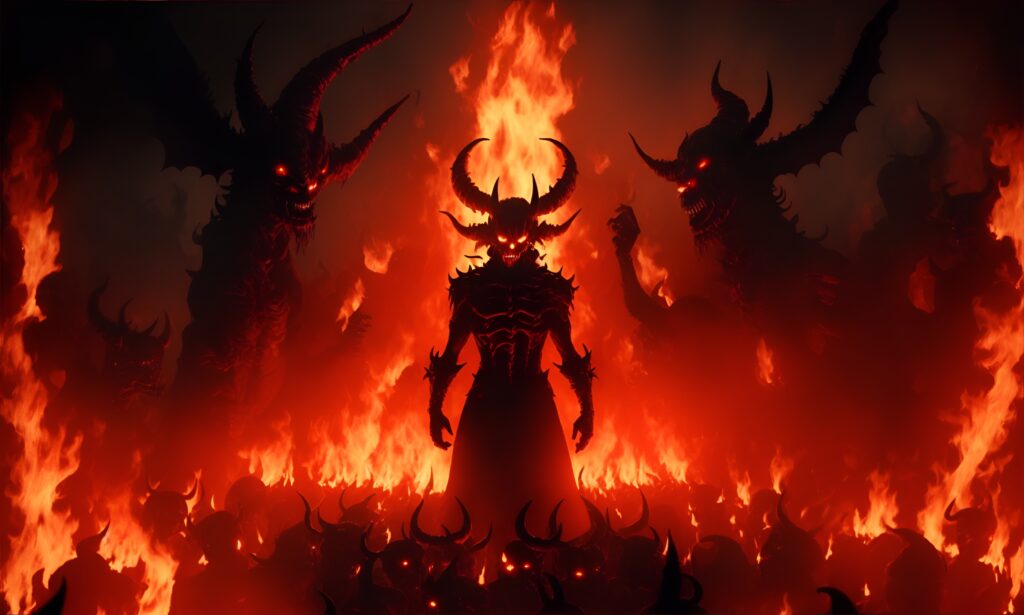Discuss the character of Satan in Paradise Lost. How does Milton portray him as a complex and compelling figure? Analyze his motivations, his rhetoric, and the significance of his role as a fallen angel and the leader of the rebellion against God.

Character of Satan
In John Milton‘s epic poem Paradise Lost, the character of Satan emerges as a complex and compelling figure. Milton presents Satan as a multidimensional character with a rich inner world, intricate motivations, captivating rhetoric, and a significant role as a fallen angel and the leader of the rebellion against God. Through his nuanced portrayal, Milton explores themes of ambition, pride, free will, and the nature of evil, creating a character that fascinates readers and challenges traditional notions of good and evil.
Satan’s motivations play a pivotal role in shaping his character. Milton delves into the depths of Satan’s psyche, revealing his complex blend of emotions, desires, and insecurities. One of Satan’s primary motivations is his pride, which stems from his refusal to accept his subordinate position in the celestial hierarchy. He resents God’s sovereignty and seeks to establish his own dominion. This pride blinds Satan to the consequences of his actions, and he becomes consumed by his desire for power and revenge. In his soliloquy, he declares, “To reign is worth ambition though in Hell: Better to reign in Hell, than serve in Heaven” (Line 263). Satan’s pride and his unwillingness to accept his place within the divine order drive him to rebel against God.
Additionally, Satan’s motivations are fueled by his ambition. He aspires to overthrow God and take control of Heaven, driven by his belief that he can rule with greater wisdom and justice. Milton portrays Satan as an ambitious figure who yearns for power and believes that his intellect and will can rival that of God. This ambition is rooted in a desire for self-glorification and a refusal to accept limitations. Satan views himself as a tragic hero, a figure who rebels against an unjust ruler to pursue his own vision of a better world. He believes that by defying God, he can achieve a higher form of existence and create a new order.
Satan’s rhetoric is a powerful tool that contributes to his complexity and allure as a character. He is a masterful orator, employing persuasive and emotive language to convey his arguments and sway the opinions of others. Satan’s speeches are filled with grandiloquent language, vivid imagery, and passionate appeals. He uses rhetoric not only as a means of manipulating his followers but also as a means of justifying his rebellion and challenging God’s authority. Through his eloquence and charisma, Satan is able to rally the fallen angels to his cause, instilling in them a sense of righteousness and purpose. His ability to captivate and inspire others showcases his leadership qualities and his talent for manipulating emotions and beliefs.
The significance of Satan’s role as a fallen angel and the leader of the rebellion against God cannot be overstated. As a fallen angel, Satan represents the tragic figure who has succumbed to pride and disobedience. His fall from grace epitomizes the consequences of defying divine authority and the perils of unchecked ambition. Milton portrays Satan’s descent from the heights of Heaven to the depths of Hell as a reflection of the moral and spiritual degradation resulting from rebellion against God. By placing Satan in this role, Milton explores the complexities of evil and the human capacity for moral corruption.
Furthermore, Satan’s character challenges traditional notions of good and evil. Milton humanizes Satan by providing insight into his inner struggles, motivations, and vulnerabilities. Satan is not portrayed as a one-dimensional embodiment of evil but as a complex being with conflicting emotions and desires. Milton suggests that even the most charismatic and intelligent beings can fall victim to their own pride and ambition, highlighting the fragility of human nature. By presenting Satan as a multifaceted character, Milton prompts readers to examine their own capacity for moral lapses and to consider the complex nature of evil.
Moreover, Satan’s role as the leader of the rebellion against God allows Milton to explore the themes of free will and the consequences of individual choice. Satan’s rebellion is fueled by his desire for autonomy and his refusal to bow down to a higher authority. He believes in the power of free will and the right to determine one’s own destiny. In this sense, Satan embodies the spirit of rebellion and individualism, challenging the notion of predetermined fate and divine sovereignty. His role as a leader symbolizes the power of individual agency and the consequences that come with exercising free will.
However, despite Satan’s complexity and allure, Milton ensures that readers do not sympathize completely with him. While Satan possesses certain admirable qualities such as courage and determination, his flaws and misguided motivations ultimately lead to his downfall. His pride blinds him to the truth and distorts his perspective, causing him to make destructive choices. Furthermore, his rebellion against God is founded on a flawed understanding of justice and an inability to recognize the inherent goodness in God’s divine plan. Milton presents Satan as a cautionary figure, highlighting the dangers of unchecked ambition and the destructive nature of pride.
In conclusion, the character of Satan in Paradise Lost is a complex and compelling figure. Milton portrays him as a multidimensional character driven by motivations of pride, ambition, and a desire for autonomy. Through his captivating rhetoric, Satan is able to sway others to his cause and challenge God’s authority. The significance of Satan’s role as a fallen angel and the leader of the rebellion against God adds depth to his character, highlighting the consequences of defying divine authority and the complexities of evil. Milton’s nuanced portrayal of Satan challenges traditional notions of good and evil, inviting readers to reflect on the complexities of human nature and the potential for moral corruption. Through Satan’s character, Milton explores themes of ambition, pride, free will, and the nature of evil, leaving a lasting impression on readers and prompting them to consider the intricate dynamics of rebellion and the consequences of defying divine authority.
*****
Read More: Questions and Answers from Paradise Lost by John Milton


